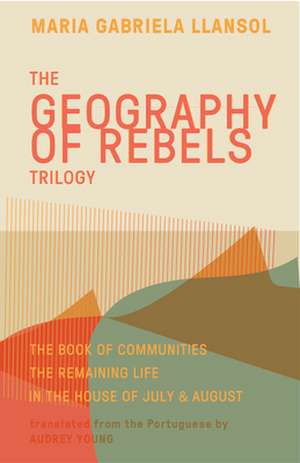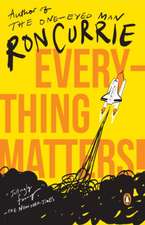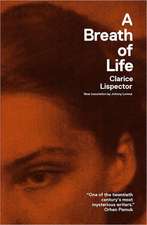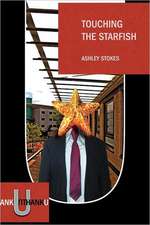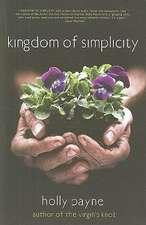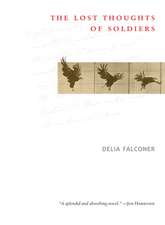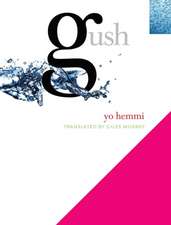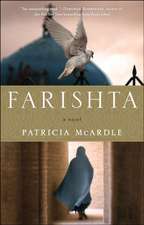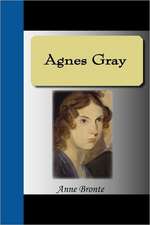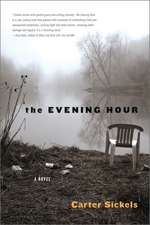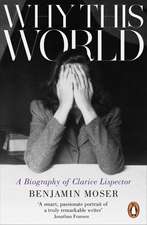The Geography of Rebels Trilogy: The Book of Communities, The Remaining Life, and In the House of July & August
Autor Maria Gabriela Llansol Traducere de Audrey Young Introducere de Benjamin Moser Cuvânt după de Gonçalo M. Tavaresen Limba Engleză Paperback – 2 oct 2017
"Llansol's text . . . creates spaces where conjecture and counterfactual accounts operate freely—granting a glimpse of an alternative reality." —Claire Williams, The Guardian
Geography of Rebels presents the English debut of three linked novellas from influential Portuguese writer Maria Gabriela Llansol. With echoes of Clarice Lispector, Llansol's novellas evoke her vision of writing as life, conjuring historical figures and weaving together history, poetry, and philosophy in a transcendent journey through one of Portugal's greatest creative minds.
Maria Gabriela Llansol (1931-2008) is one of the preeminent Portuguese writers of the 20th century, twice awarded the prize for best novel from the Portuguese Writers' Association.
Geography of Rebels presents the English debut of three linked novellas from influential Portuguese writer Maria Gabriela Llansol. With echoes of Clarice Lispector, Llansol's novellas evoke her vision of writing as life, conjuring historical figures and weaving together history, poetry, and philosophy in a transcendent journey through one of Portugal's greatest creative minds.
Maria Gabriela Llansol (1931-2008) is one of the preeminent Portuguese writers of the 20th century, twice awarded the prize for best novel from the Portuguese Writers' Association.
Preț: 96.72 lei
Nou
Puncte Express: 145
Preț estimativ în valută:
18.51€ • 20.12$ • 15.56£
18.51€ • 20.12$ • 15.56£
Carte disponibilă
Livrare economică 31 martie-14 aprilie
Livrare express 14-20 martie pentru 27.74 lei
Preluare comenzi: 021 569.72.76
Specificații
ISBN-13: 9781941920633
ISBN-10: 1941920632
Pagini: 300
Dimensiuni: 133 x 210 x 46 mm
Greutate: 0.43 kg
Editura: Deep Vellum Publishing
Colecția Deep Vellum Publishing
ISBN-10: 1941920632
Pagini: 300
Dimensiuni: 133 x 210 x 46 mm
Greutate: 0.43 kg
Editura: Deep Vellum Publishing
Colecția Deep Vellum Publishing
Recenzii
"Her idiosyncratic, highly creative texts reached beyond conventional "figurative" writing. . . . In particular, her narrators function almost as a medium, or channel, for a series of fluctuating identities and voices or visitors (figures) who inhabit her consciousness and engage in discussion among themselves. Llansol's text also creates spaces where conjecture and counterfactual accounts operate freely - granting a glimpse of an alternative reality. She created iconoclastic, anti-nationalist texts that deflated mythical figures and representations of the past. She stressed Europe's evolution through the growth of free will, free thought and flourishing artistic and scientific developments." — Claire Williams, The Guardian
"Intense and sublime." — José Manuel Barroso, former president of the European Commission
Notă biografică
Maria Gabriela Llansol (1931-2008) is a singular figure in Portuguese literature, one of the greatest writers of the 20th century, yet never before translated into English. Although entirely unknown in the United States, she twice won the award for best novel from the Portuguese Writers’ Association with her textually idiosyncratic, fragmentary, and densely poetic writing; other recipients of this prize include José Saramago and António Lobos Antunes. Upon her death in 2008, she left behind twenty-seven published books and more than seventy unpublished notebooks, all of which evade any traditional definitions of genre. Despite this body of work, only a few short pages have ever been translated into English.
In 1965, Llansol left Lisbon and moved to an isolated village in the Belgian countryside. She would spend twenty years there in voluntary exile, teaching at the local school, translating Rimbaud and Baudelaire, and reading medieval mystics. Unlike her contemporaries back in Portugal, she did not write to describe reality, but rather to exist through the process of writing. Eliding any sense of plot, her texts instead transcribe the movements of bodies and animals and light. (They “correspond to inner earthquakes,” she would say in an interview.)
Her first novel, The Book of Communities, was published in 1977. It is the first volume of "Geography of Rebels," a trilogy of novellas mapping a series of encounters between poets, mystics, beguines and heretics, all of which take place in another version of the medieval war between peasants and princes in Central Europe. Llansol appropriates figures like Saint John of the Cross and Thomas Mu¨ntzer and pulls them into a transhistorical dialogue, constructing a succession of what she calls “luminous scenes,” where they coexist outside of time.
She was born in Lisbon, where her bibliophile father was chief accountant at a paper factory and her doting mother a housewife. She graduated with a degree in law from Lisbon University in 1955 and two years later obtained a degree in educational sciences. She then ran a nursery school before publishing her first short stories in 1962, inspired by her interaction with children.
In 1965 she and her husband Augusto Joaquim moved to Belgium, in voluntary exile from the repressive regime of António de Oliveira Salazar. The couple became part of a cooperative that ran an experimental school, and also made and sold furniture and food. While living in the hamlet of Herbais, Llansol immersed herself in literature, philosophy and theology, particularly the social history of Europe and medieval mystic poets.
The experience of educating children from a variety of backgrounds and nationalities - some with problems such as autism or Down's syndrome - influenced her work considerably. So did the perspective afforded by living and working in a foreign language, in an isolated community far from home.
In the mid-1980s she moved back to Portugal, to the historic hilltop town of Sintra, and from then on published almost one book a year, largely ignored by the general public but gradually gathering a loyal, diverse group of readers, including academics and even the current president of the European commission, José Manuel Barroso, who has called her writing "intense and sublime".
Llansol found the conventions of traditional literature too restrictive and the subject matter available to novelists exhausted. She was not interested in describing reality, but rather in using language as an organic, living process. Writing, for her, was reality. In her diary Um Falcão no Punho (A Falcon on the Wrist, 1985), she wrote: "Literature does not exist. When you are writing, the only thing you need to know is which reality you are entering and whether or not there is a suitable technique that can open up the way to others."
Audrey Young is a translator, researcher, and archivist. She received a Fulbright grant to research non-theatrical film in Portugal and studied Portuguese language and culture at the University of Lisbon with a scholarship from the Instituto Camões. She has worked at the Getty Research Institute, the Cineteca Nacional México, and the Arquivo Nacional do Brasil, among other archives.
In 1965, Llansol left Lisbon and moved to an isolated village in the Belgian countryside. She would spend twenty years there in voluntary exile, teaching at the local school, translating Rimbaud and Baudelaire, and reading medieval mystics. Unlike her contemporaries back in Portugal, she did not write to describe reality, but rather to exist through the process of writing. Eliding any sense of plot, her texts instead transcribe the movements of bodies and animals and light. (They “correspond to inner earthquakes,” she would say in an interview.)
Her first novel, The Book of Communities, was published in 1977. It is the first volume of "Geography of Rebels," a trilogy of novellas mapping a series of encounters between poets, mystics, beguines and heretics, all of which take place in another version of the medieval war between peasants and princes in Central Europe. Llansol appropriates figures like Saint John of the Cross and Thomas Mu¨ntzer and pulls them into a transhistorical dialogue, constructing a succession of what she calls “luminous scenes,” where they coexist outside of time.
She was born in Lisbon, where her bibliophile father was chief accountant at a paper factory and her doting mother a housewife. She graduated with a degree in law from Lisbon University in 1955 and two years later obtained a degree in educational sciences. She then ran a nursery school before publishing her first short stories in 1962, inspired by her interaction with children.
In 1965 she and her husband Augusto Joaquim moved to Belgium, in voluntary exile from the repressive regime of António de Oliveira Salazar. The couple became part of a cooperative that ran an experimental school, and also made and sold furniture and food. While living in the hamlet of Herbais, Llansol immersed herself in literature, philosophy and theology, particularly the social history of Europe and medieval mystic poets.
The experience of educating children from a variety of backgrounds and nationalities - some with problems such as autism or Down's syndrome - influenced her work considerably. So did the perspective afforded by living and working in a foreign language, in an isolated community far from home.
In the mid-1980s she moved back to Portugal, to the historic hilltop town of Sintra, and from then on published almost one book a year, largely ignored by the general public but gradually gathering a loyal, diverse group of readers, including academics and even the current president of the European commission, José Manuel Barroso, who has called her writing "intense and sublime".
Llansol found the conventions of traditional literature too restrictive and the subject matter available to novelists exhausted. She was not interested in describing reality, but rather in using language as an organic, living process. Writing, for her, was reality. In her diary Um Falcão no Punho (A Falcon on the Wrist, 1985), she wrote: "Literature does not exist. When you are writing, the only thing you need to know is which reality you are entering and whether or not there is a suitable technique that can open up the way to others."
Audrey Young is a translator, researcher, and archivist. She received a Fulbright grant to research non-theatrical film in Portugal and studied Portuguese language and culture at the University of Lisbon with a scholarship from the Instituto Camões. She has worked at the Getty Research Institute, the Cineteca Nacional México, and the Arquivo Nacional do Brasil, among other archives.
Descriere
English debut with three linked novellas by influential cult Portuguese writer interweaving history, poetry, and philosophy into transcendent literary vision.
